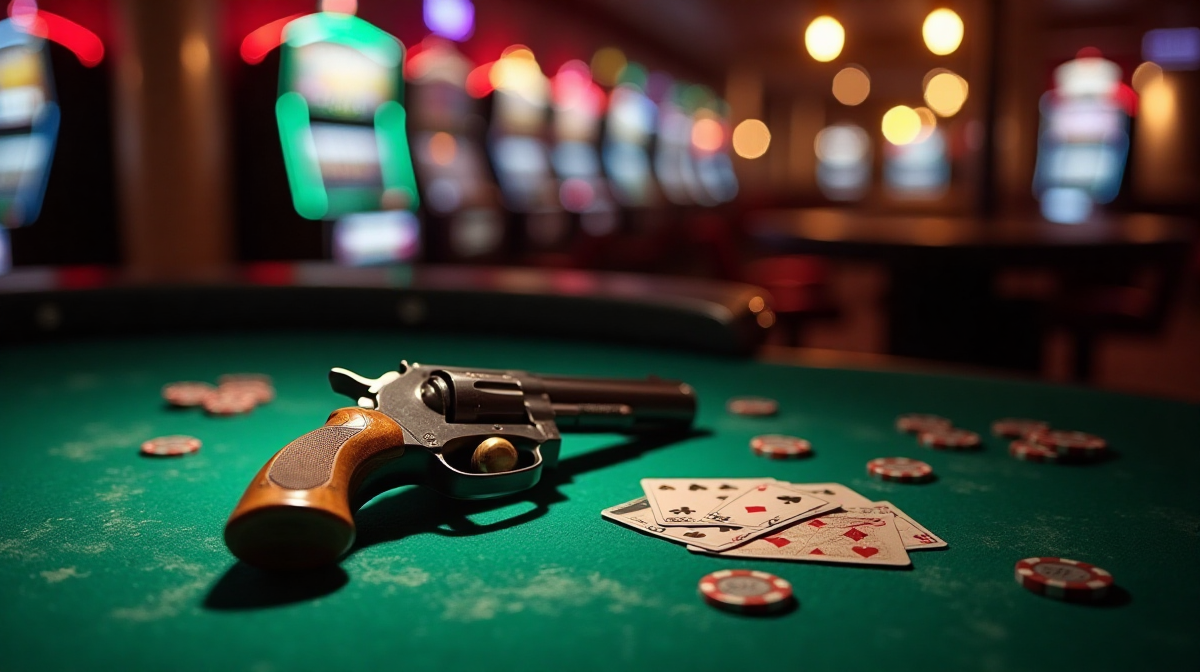Russian Roulette: The Ultimate Guide
Introduction to Russian Roulette
Historical Origins & Evolution
Early Accounts & Folklore
The origins of Russian Roulette are shrouded in mystery and debate. While often associated with 19th-century Russia, concrete evidence is scarce. Some historians suggest it emerged among impoverished officers who gambled with their service revolvers, spinning the cylinder with one bullet to increase the stakes. The practice, born from desperation and a reckless disregard for life, quickly became a grim spectacle.
Rise in Popular Culture
Russian Roulette’s chilling allure has repeatedly captivated audiences through literature and film. From short stories to iconic movies like The Deer Hunter, the game’s depiction often serves as a metaphor for the randomness of fate and the psychological toll of war. These portrayals, while fictional, have cemented the game’s place in the collective consciousness. Interestingly, the pursuit of calculated risk is mirrored in other areas, even in the world of sports betting; for example, analyzing bet 365 odds for potential gains involves a degree of chance and strategy.
The Game's Connection to War & Desperation
The game's roots lie deeply intertwined with conflict and despair. Stories suggest it was born from the brutal realities of war, where soldiers facing certain death sought a morbid form of control over their fate. This connection to desperation continued throughout the 20th century, surfacing in contexts of extreme hardship and hopelessness.
Defining Russian Roulette: Rules & Variations
The Standard Method
The most commonly understood form of Russian Roulette involves a revolver with one bullet loaded into a rotating cylinder. Participants take turns spinning the cylinder, pointing the gun at their head, and pulling the trigger. The outcome is entirely dependent on chance – a chilling demonstration of life and death hinging on a single pull.
Variations - Number of Bullets, Chamber Size
Variations exist, adding layers of complexity and increasing the risk. Some variations involve multiple bullets, altering the probability of survival. Others change the chamber size, impacting the odds. These alterations, however, don’t diminish the inherent danger; they simply shift the statistical likelihood. Like predicting the outcome of a sporting event, even with detailed analysis like bet 365 predictions, there's always an element of unpredictability.
Psychological Aspect: The Role of Chance & Fear
Beyond the physical risk, Russian Roulette is a profoundly psychological game. The anticipation, the terror, and the awareness of impending doom create an unbearable strain on the mind. The element of chance is paramount, coupled with the player’s internal struggle to overcome fear.
Why People Play – Motivations & Risk Factors
Desperation & Hopelessness
For some, Russian Roulette represents a final, desperate act born from overwhelming hopelessness. Individuals facing unbearable circumstances may see it as a twisted form of control or a way to end their suffering.
Seeking Thrills & Adrenaline
A disturbingly small fraction may be motivated by a dangerous pursuit of thrills and adrenaline. This stems from a reckless disregard for life and a desire to push boundaries.
Mental Health Concerns & Suicidal Ideation
Underlying mental health issues, particularly depression and suicidal ideation, are often significant contributing factors. The game can become a manifestation of deep-seated psychological distress.
The Science & Psychology Behind Russian Roulette
Probability & Statistics of Survival
Calculating Odds with Different Chamber Sizes
The probability of survival in Russian Roulette is directly related to the number of chambers in the revolver. With a six-chamber revolver and one bullet, the odds of survival are 5/6 (approximately 83.3%). However, each spin resets the odds, meaning past outcomes have no bearing on future results. Similar to attempting to predict a bet 365 prediction correct score, past results are not indicative of future outcomes.
The Illusion of Control & Gambler's Fallacy
Players often fall prey to the illusion of control, believing they can somehow influence the outcome. The gambler’s fallacy – the belief that after a series of losses, a win is “due” – also plays a role, despite the independence of each spin.
Statistical Impact of Multiple Rounds
Each subsequent round of Russian Roulette dramatically decreases the odds of survival. The more times the cylinder is spun and the trigger pulled, the higher the probability of a fatal outcome.
The Psychological Effects on Participants
Anxiety, Fear & Panic Attacks
The intense anxiety and fear experienced by participants are overwhelming. Panic attacks, characterized by rapid heartbeat, shortness of breath, and a sense of impending doom, are common.
The Role of Cognitive Dissonance
Participants may experience cognitive dissonance – the mental discomfort resulting from holding conflicting beliefs. The desire to survive clashes with the deliberate act of risking one’s life, creating significant psychological distress.
Long-Term Trauma & PTSD
Even surviving a round of Russian Roulette can leave lasting psychological scars. Post-traumatic stress disorder (PTSD), characterized by flashbacks, nightmares, and hypervigilance, is a significant risk.
Brain Chemistry & the Reward System
The Appeal of Dangerous Games
The human brain is wired to seek novelty and challenges. Dangerous games, like Russian Roulette, can trigger the release of dopamine, a neurotransmitter associated with pleasure and reward. This can create a perverse cycle of risk-taking behavior.
Impulsivity and Decision-Making Under Pressure
Extreme pressure and fear impair cognitive function, leading to impulsive decisions. The ability to rationally assess risk is compromised, increasing the likelihood of engaging in dangerous behavior.

Russian Roulette in Culture & Media
Portrayals in Literature & Film
Analysis of Key Scenes
The iconic scene in The Deer Hunter remains one of the most harrowing depictions of Russian Roulette in cinematic history. The scene’s visceral intensity and psychological realism have profoundly shaped the public’s perception of the game. Its dramatic effect is comparable to the intense anticipation surrounding a major sporting event, where fans rely on bet 365 insights.
How the Media Romanticizes or Demonizes the Game
Media portrayals often fall into two extremes: romanticizing the game as a symbol of rebellion or demonizing it as a sign of madness. Both approaches can be problematic, potentially glamorizing or sensationalizing a deadly act.
The Effect of Media Representation on Perception
Media representations can shape public perception, influencing attitudes and beliefs about Russian Roulette. Exposure to the game in popular culture can desensitize individuals to its dangers or even normalize the behavior.
Russian Roulette as a Metaphor
Representing Life’s Uncertainties
Russian Roulette frequently serves as a metaphor for the inherent uncertainties of life. The random nature of the game mirrors the unpredictable events that shape our destinies.
Symbolism of Risk & Fate
The game symbolizes the constant presence of risk and the inescapable power of fate. It highlights the precariousness of existence and the fragility of human life.
The Game as a Reflection of Societal Issues
Russian Roulette can also be interpreted as a reflection of broader societal issues, such as despair, alienation, and the search for meaning in a chaotic world.
Real-Life Incidents & Controversies
Documented Cases
Documented cases of real-life Russian Roulette are rare, often shrouded in secrecy due to the sensitive nature of the act and privacy concerns.
Legal Ramifications & Ethics
Participating in Russian Roulette carries severe legal ramifications, including charges such as assault with a deadly weapon, attempted murder, or murder. The ethical implications are equally profound, raising questions about individual responsibility and the sanctity of life.
The Dangers & Consequences
Immediate Physical Risks
Fatal Injury – Potential for Death
The most obvious and devastating consequence of Russian Roulette is the potential for fatal injury. A single bullet can inflict a fatal wound, resulting in immediate death.
Severe Wounds & Disability
Even if the initial spin doesn't result in death, a bullet wound can cause severe and life-altering injuries, leading to permanent disability.
The Importance of Firearm Safety
Firearm safety is paramount, even when discussing the hypothetical scenario of Russian Roulette. Treating all firearms as loaded and following proper safety protocols is crucial. Just as understanding roulette rules is crucial for responsible gaming, understanding firearm safety is essential for preventing tragedy.
Long-Term Psychological Trauma
PTSD, Depression, and Anxiety
Surviving Russian Roulette often leads to long-term psychological trauma, including PTSD, depression, and anxiety. These conditions can significantly impair quality of life.
The Impact on Relationships and Social Life
The trauma associated with Russian Roulette can strain relationships and disrupt social life. Individuals may struggle to connect with others and maintain healthy social connections.
The Risk of Suicidal Thoughts and Attempts
The psychological distress caused by Russian Roulette can increase the risk of suicidal thoughts and attempts. Seeking professional help is crucial for preventing further harm.
Legal Consequences & Criminal Charges
Assault with a Deadly Weapon
Participating in Russian Roulette can be charged as assault with a deadly weapon, even if no one is injured.
Attempted Murder/Murder
If the game results in injury or death, participants can face charges of attempted murder or murder, carrying severe penalties.
Reckless Endangerment
Even without direct harm, engaging in Russian Roulette can be considered reckless endangerment, a criminal offense.

Help & Resources
Recognizing Warning Signs of Suicidal Ideation
Changes in Behavior, Mood, and Interests
Changes in behavior, mood, and interests, such as withdrawal from social activities, loss of appetite, or increased irritability, can be warning signs of suicidal ideation.
Expressing Feelings of Hopelessness or Worthlessness
Expressing feelings of hopelessness, worthlessness, or guilt can indicate that someone is struggling with suicidal thoughts.
Talking About Death or Suicide
Directly talking about death or suicide, even in a casual manner, should be taken seriously.
Where to Seek Help – Crisis Hotlines & Mental Health Organizations
National Suicide Prevention Lifeline
The National Suicide Prevention Lifeline is available 24/7 at 988.
The Crisis Text Line
The Crisis Text Line provides free, 24/7 crisis support via text message. Text HOME to 741741.
Resources for Mental Health Support
Numerous mental health organizations offer support and resources, including the National Alliance on Mental Illness (NAMI) and the Mental Health America (MHA).
Supporting Someone at Risk
How to Start a Conversation
If you're concerned about someone, start a conversation by expressing your care and concern.
Active Listening and Empathy
Listen actively and empathetically, without judgment. Allow the person to express their feelings without interruption.
Encouraging Professional Help
Encourage the person to seek professional help from a therapist or counselor.

